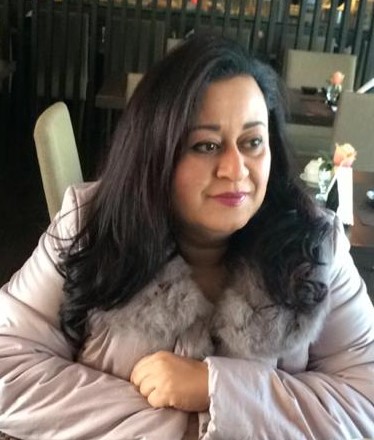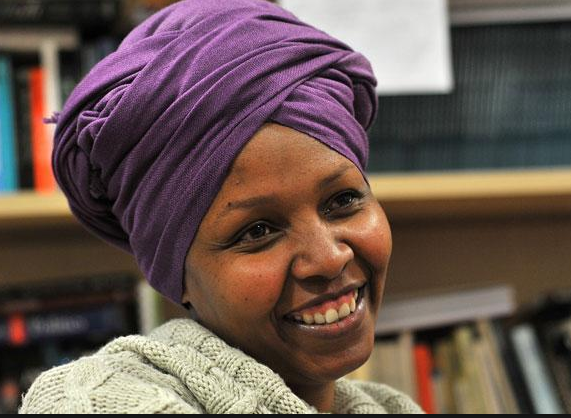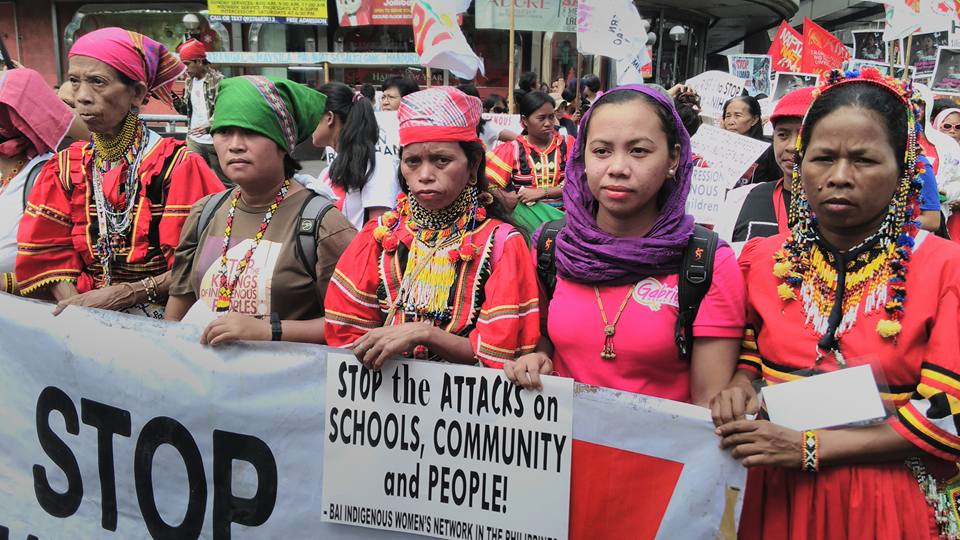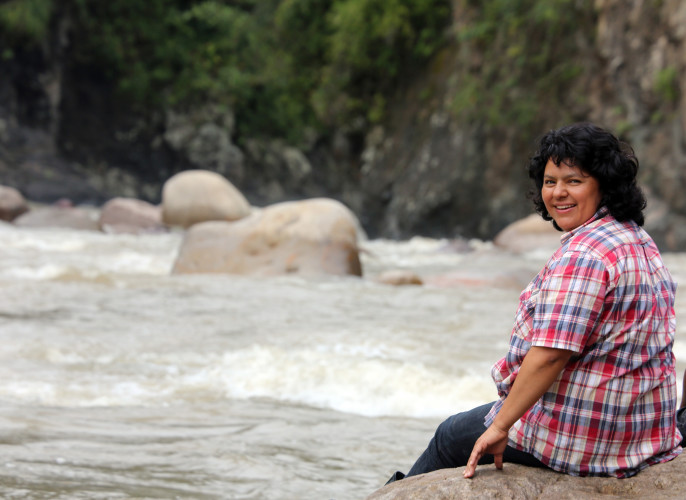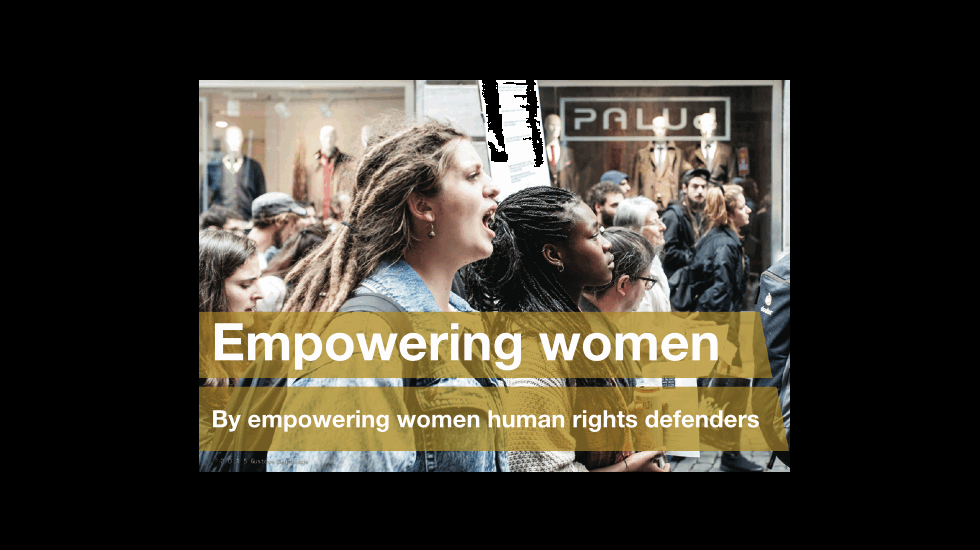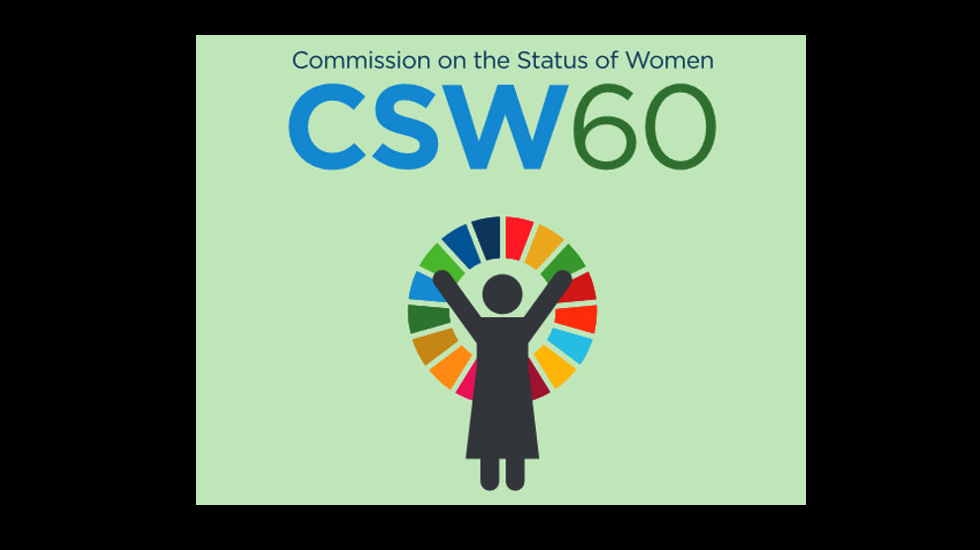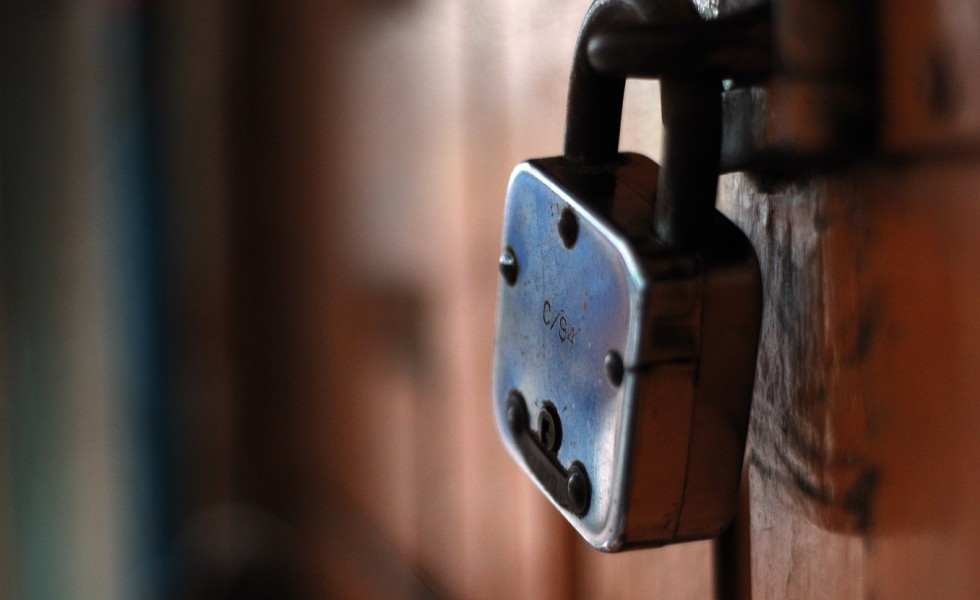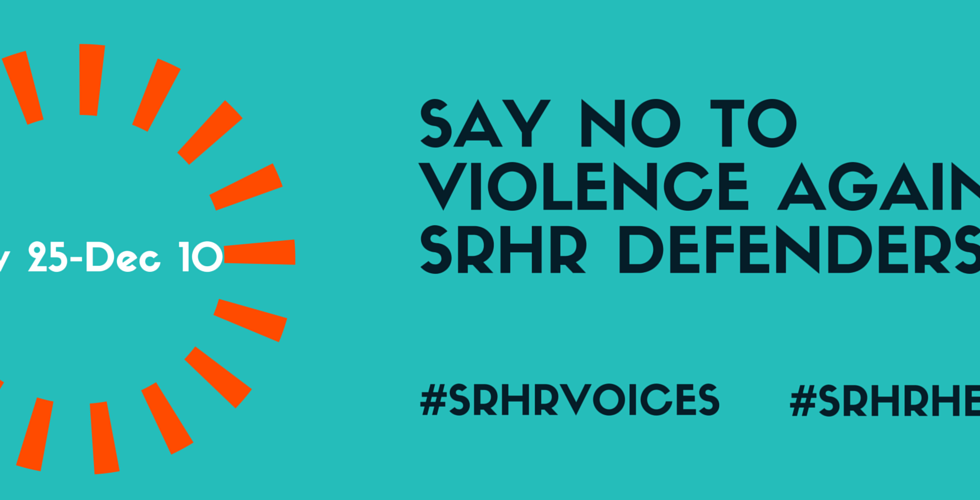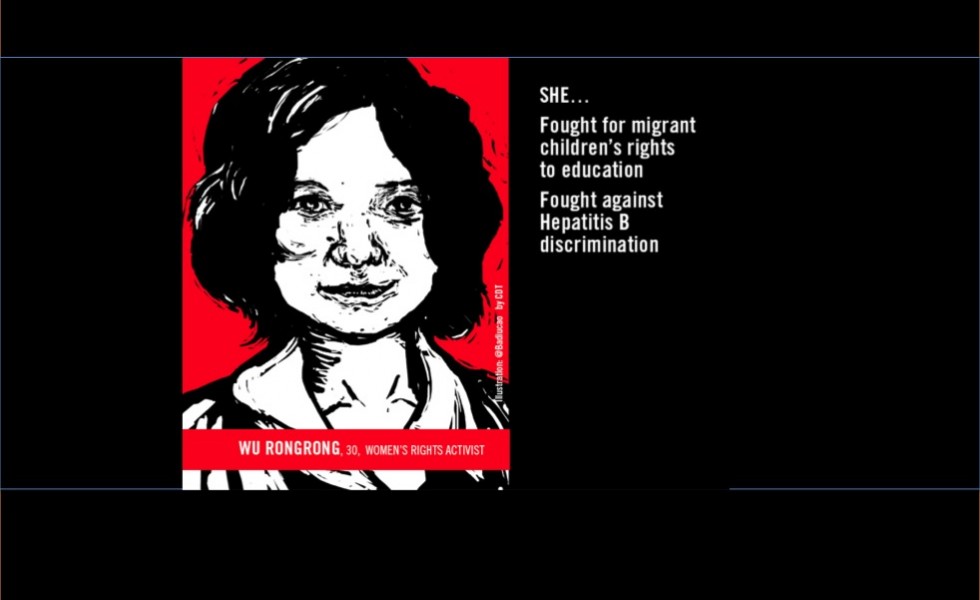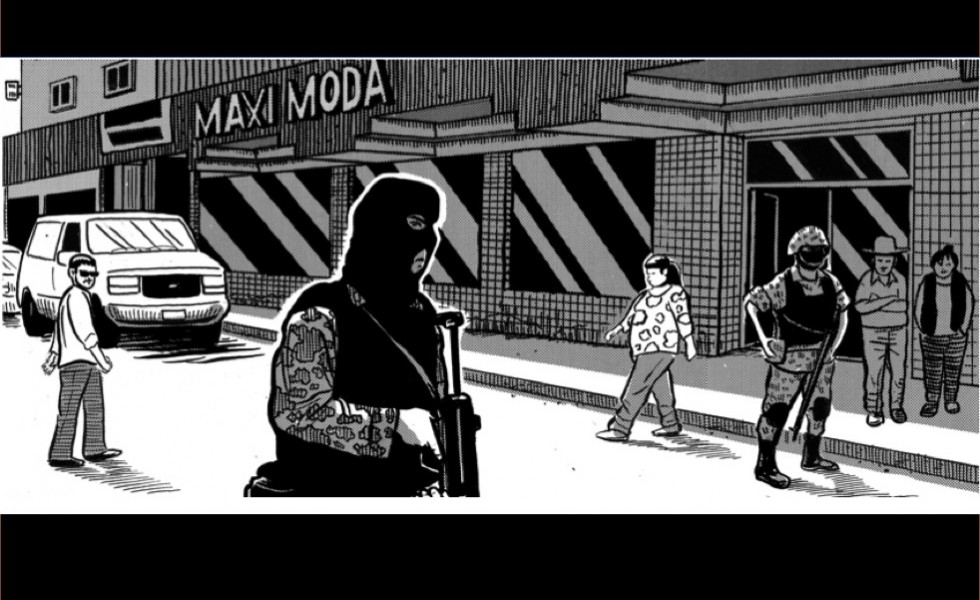
Bahrain: Ghada Jamsheer arrested
Baharain: Ghada Jamsheer arrested, and “illegal gathering” charges made against Maytham Al-Salman and Dr Taha Al-Derazi, who remains in detention.
More prominent human rights defenders have been interrogated, charged and jailed in Bahrain in violation of their rights to freedom of expression and assembly, according to reports received by the Gulf Centre for Human Rights (GCHR).
On 15 August, women’s rights defender and President of the Women’s Petition Committee (WPC), Ghada Jamsheer, who is also a writer and blogger, was detained upon arrival from London, the United Kingdom at Bahrain’s airport in Manama. She arrived at 8pm local time and has not been released, but local reports indicate she has been moved from the airport. It is believed that she is being held in connection to sentences imposed on her for exercising her right to free expression on twitter. As of 19 August 2016, she has not been released and has not been granted the right to speak to a judge in order to request community service as an alternative to serving a prison sentence. She is believed to be held at Isa Town Detention Centre for Women, where she was held during a previous arrest in the same case in 2014.
Read more here.
A letter to Chief Justice of Kenya to End Police and Judicial Harassment of Ruth Mumbi and Bunge la Wamama
This letter is directed to Dr. Willy Mutunga, Chief Justice of Kenya and President of the Supreme Court of Kenya to demand an end to Police and Judicial Harassment of Ruth Mumbi and Bunge la Wamama following their Campaign to Prevent Maternal Deaths.
Dear Doctor Mutunga,
We urge you to devote your full attention to an alarming case of police and judicial harassment against Women Human Rights Defenders (WHRDs) in Kenya. Ms. Ruth Mumbi and members of the women’s social movement Bunge la Wamama (BLM) advance women’s human rights and raise awareness about the disturbing rates of un-investigataed maternal deaths at a maternity hospital in Huruma. Due to this important work, they have endured a 5 year long persecution, including evident police and judicial harassment.
On Wednesday April 20th , 2016 Ms. Mumbi and other WHRDs were arrested by the police and remanded at the court of Makadara. Reportedly, the court had issued warrants for their arrest upon Ms. Mumbi and her colleagues’ inability to appear in Court on December 4 th , 2015. This single case of inability to appear occurred due to circumstances that were well beyond their control.
The WHRDs were originally charged at the Makadara Magistrate court with the crime of “inciting public to cause violence” (Criminal Case 953/2011). The case has dragged on in court for 5 years, with the prosecution providing repeated pretexts to postpone the matter when the accusers failed to show up in court, which the court willingly accepted. It must be noted that with the exception of December 4 th , 2015, the accused, namely Ms. Mumbi and her colleagues, have always dutifully attended in court, frustrating as it may be when justice is delayed. It is thus of great concern that the court would find it prudent, in this instance, to take the very punitive action of ordering the arrest of the accused, thereby indicating the selective application of justice.
The case and ensuring injustice faced by the WHRDs are a direct result of their human rights work in a Nairobi informal settlement. In 2011, Ms. Mumbi and colleagues documented several deaths at a local health facility. They organized a campaign to alert state authorities of repeated cases of maternal mortality that had not been investigated. On February 28 2011 police disrupted a peaceful protest during which the organizers were arrested, beaten and some were sexually abused. They were held at the local police station until March 1 st , 2011, when they presented in court. The WHRDs reported that they were detained in appalling and inhumane conditions. Unable to raise the exorbitant bail, they were detained at Langata Women Prison until March 2 nd , 2011 when partner organizations posted bail for them.
Ruth Mumbi and BLM are conducting vital work to give voice to disenfranchised women in informal settlements and throughout Kenya; empower and educate communities about their rights; and promote justice and accountability in the public sector, thus strengthening human rights and the rule of law in Kenyan society. Their work is informed by a commitment to the rights of women and the conviction that No woman should die while giving birth. Giving life to a human being in a safe, dignified and respectable way is a basic human right. As a society it is our obligation to guard this right and ensure that women can access it.
The work of Ms. Mumbi as a WHRD has won international recognition. In 2013 she was a finalist of the Frontline Defenders International Human Rights Award, and was granted a human rights fellowship at the Centre for Applied Human Rights at the University of York. She is also receiving the continuous support of Peace Brigades International. It is both unacceptable and deplorable that at the local level, where their work has contributed to highlighting the plight of marginalised women living in poverty, Ms Mumbi and her colleagues should be harassed and criminalised.
Dr. Mutunga, we honour your relentless struggle and immense contribution to justice and democracy. We trust that you will exercise genuine concern in this case, ensure that the matter is speedily concluded or dismissed. We would hope that your response sends a strong message that the rights of all Women Human Rights Defenders are fully respected, and their valuable work in Kenyan society is recognized and celebrated.
Sincerely Yours,
Women Human Rights Defenders International Coalition
National Coalition of Human Rights Defenders – Kenya
The Centre for Applied Human Rights, University of York
Global Fund for Women
JASS (Just Associates)
Statement in solidarity with non-violent protestors in Kidapawan City, Philippines
The Women Human Rights Defenders International Coalition (WHRDIC) strongly condemns the violent response by the police in light of the protests in Kidapawan City, North Cotabato Province, Philippines.
Since March 30, 2016, more than 6,000 farmers from various municipalities of North Cotabato Province have been holding a protest to demand rice subsidies from the government following foot shortages caused by drought.
When farmers asked for rice, the government responded with bullets.
On April 1 the local governor ordered the police to disperse the barricade, and in the process, police used water cannons, batons, and open fire against the non-violent protestors. The attack led to 2 confirmed dead (one of whom was a woman farmer), over 100 wounded (including children), and many are missing or detained. Among the detained, there are 34 women, 3 of whom are pregnant and 4 of whom are minors. Bai Ali Indayla, Secretary General of KAWAGIB Alliance for the Advancement of Moro Human Rights, was on the frontlines of this barricade as a part of the chief negotiating committee on behalf of the farmers.
After the police attack, protesters, including Bai Ali Indayla, sought refuge in the Spottswood, United Methodist Church, Kidapawan City. PNP-Region 12 and other units of state forces surrounded the church and prevented anyone from leaving the church compound. Support groups bringing food were barred and intimidated. Bai Ali was wounded during the violent dispersal, as she was pushed by riot policemen and hit by a water cannon.
Karapatan, a human rights organization in the Philippines, of which Bai Ali and her organization KAWAGIB are members, reported that a national fact-finding and humanitarian mission would be conducted April 4-6 on the Kidapawan incident. We call on the government of the Phillipines to provide all necessary conditions for Karapatan to conduct their human rights investigation in a conducive manner, free from harm or hindrance.
The Women Human Rights Defenders International Coalition condemns the attacks perpetrated by State agents against the farmers, including women and human rights defenders. We call on the Government of the Philippines to end the gross and violent attack of the peaceful protestors. We demand the release of those unlawfully arrested and detained and accountability for the violations perpetrated against the protestors.
The Philippines is a notoriously dangerous country for WHRDs defending their land, culture and livelihood. The WHRDIC realizes the meaningful and committed efforts of WHRDs in Philippines in defending their most fundamental rights under extreme risk. We call on our international community to join us in solidarity with these non-violent protestors mobilizing for their fundamental human rights.
WHRDIC MOURNS THE DEATH OF INDIGENOUS LEADER AND FEMINIST ACTIVIST BERTA CACÉRES AND DEMANDS JUSTICE
We Demand Justice for Berta and Call on the Honduran Government and the International Community to Stop Violence against Women Human Rights Defenders
“I have been persecuted not just for political leadership but also for being a woman, for being Lenca. In this country it’s not the same being a male leader and being a female leader. And that comes with a very heavy weight.” – Berta Cáceres
Berta Isabel Cáceres Flores was a Woman Human Rights Defender (WHRD) and prominent Lenca indigenous and feminist activist in Honduras. In the morning of March 3rd, 2016, Berta Cáceres was murdered in her sleep, in her home in Intibucá, Honduras.
Ms. Cáceres was the General Coordinator of the Civic Council of Popular and Indigenous Organisations of Honduras (COPINH) and a member of Honduras’ National Network of Women Human Rights Defenders. Berta led the struggle for the rights of the Lenca indigenous peoples and against the construction of a hydroelectric project, Agua Zarca, by the Honduran company Desarrollos Energéticos S.A. (DESA). The regional Central American Bank for Economic Integration (CABEI), the Dutch development bank FMO and Finnfund from Finland finance the project and Voith-Hydro (Siemens) supply the project’s equipment. Following this and other murders and violent attacks, FMO and Finnfund have announced their intention to withdraw from Agua Zarca project.
This political assassination is intended to silence the people’s opposition to a destructive and profit-driven model of development that has been violently imposed by corporate and state authorities. Berta was murdered because she confronted the country’s economic and political elites in the struggle for life, justice and the environment. She was constantly attacked due to her human rights work and also for being an indigenous woman.
Berta’s life was in grave danger for a long time and she has received countless death threats. She was subjected to attacks, threats and sexual harassment from people associated with DESA as well as arbitrary arrests and criminalization by Honduran State officers and entities. For this reason, Berta was granted precautionary protection measures by the Inter-American Commission of Human Rights (IACHR) in 2009.
“They have threatened me with death. I have received threats by cell phone. Sexual harassment from the security guards of these companies. I have received threats against my family, against my daughters, against my son.” (Berta Cáceres, May 2014, Jacobin)
The WHRDIC warns that Berta’s assassination is symptomatic of the global backlash against WHRDs. Struggles for land and territory entail particular risks due to confronting powerful corporate actors. Indigenous women worldwide lead struggles to protect their territories and to counter the exploitation and abuse of people and nature. They confront “profit over people” paradigms as well as ingrained social structures of patriarchy and white supremacy.
“I think it may be easier to confront the transnationals and the army than it is to confront the patriarchy, because that we encounter everywhere.”
When women take leadership, they challenge gender norms and often contest the patriarchal culture perpetuated by communities, states and corporations. As a result, WHRDs are subjected to gender-specific and sexual violence and intimidation. Threats against their families and loved ones are intended to force them to abandon their critical work for rights and justice.
With lethal violence is on the rise worldwide, states have the responsibility to act for the gender-specific integrated security and safety of WHRDs. States have the opportunity today to express true commitment to WHRDs in two key processes in the United Nations. Member States of the United Nations can endorse and fulfil their obligations on protection measures, currently debated in the Commission on the Status of Women (CSW) and negotiated at the 31st Session of the Human Rights Council around the Resolution on Human Rights Defenders.
The WHRD IC reiterates that protection measures for Human Rights Defenders cannot be detached from gender-specific analysis, informed by an intersectional framework of race, ethnicity, class and sexual identity.
“We (compañeras from COPIHN) have not accepted the notion that we first had to fight against transnationals, and later against racism, and lastly against violence against women. We all experience multiple forms of domination – women being the most affected – so the fight must also be multiple and diverse, recognizing these multiple forms of domination.”
We celebrate the clarity and coherence of Berta’s voice and political action; her enormous generosity towards people and nature; her rebellious integrity to resist powerful institutions and the profit-driven, patriarchal and racist ideologies that justify them. We stand together in creating alternatives to global systems of economic and patriarchal domination and exploitation of human lives and natural resources. In the spirit of feminist solidarity, we reaffirm our commitment to Berta’s vision that ties together human life, social equality and environmental justice.
We Call on the Government of Honduras
- To ensure an impartial and transparent investigation with the collaboration and oversight from regional and international human rights mechanisms, primarily the IACHR;
- To immediately assume responsibility to end repression and lethal violence against the members of COPINH and all women and men Human Rights Defenders; to fully comply with the precautionary measures provided by the IACHR to Berta’s family, COPINH and the Honduran WHRD Network;
- To acknowledge its responsibility in failing to provide adequate protection measures to Berta Cáceres and to investigate previous attacks and threats against Berta and COPINH;
- To take measures to end to the murder, persecution, and criminalization of all Human Rights Defenders and environmental activists, to commit to their individual and organizational safety and security, and to develop gender-specific measures of protection for Women Human Rights Defenders (WHRDs);
- To immediately remove all movement restrictions for the witness to Berta’s murder – Gustavo Castro Soto, the Coordinator of Other Worlds/Friends of the Earth Mexico – and to immediately ensure his safe return to Mexico.
We Call on DESA, FMO and Finnfund
- To definitively withdraw from the Gualcarque River and put an end to the death and destruction that the Agua Zarca project brings upon the local communities;
- To consult indigenous communities and women prior to commencement of any project, and to withdraw from projects imposed on communities undemocratically and against their will;
- To take pro-active measures to prevent violations against HRDs by personnel, including security personnel.
We Call on the Governments of the Netherlands and of Finland
- To direct FMO and the Finnish Fund for Industrial Cooperation (Finnfund) respectively to completely divest from the Agua Zarca project and to monitor this process.
We Call Upon Civil Society Organizations Worldwide
- To continue monitoring the progress towards an independent and transparent investigation;
- To raise awareness about the gender-specific risks that Women Human Rights Defenders (WHRDs) face, and promote adequate protection measures;
- To acknowledge and pay respect to the critical work of WHRDs resisting patriarchy, racism, sexism and homophobia, among other important causes of their human rights work and struggles for justice.
UN EVENT CALLS FOR PROTECTION AND PARTICIPATION OF WOMEN HUMAN RIGHTS DEFENDERS IN THE IMPLEMENTATION OF AGENDA 2030
(New York, 17 March 2016) “Women Human Rights Defenders (WHRDs) are crucial in achieving the goals laid out in Agenda 2030, and states and the United Nations must take concrete steps to ensure that they are protected and recognised as key stakeholders and partners at all levels in implementing these goals,” said panelists at a high-level UN event yesterday. The event – “Empowering Women by Empowering Women Human Rights Defenders” – took place at the 60th session of the UN Commission on the Status of Women (CSW).
Panelists paid tribute to Berta Caceres, a woman human rights defender from Honduras who was killed in her home on 3 March. Berta’s daughter, Bertha Isabel Zuniga Caceres, spoke on the panel, describing her mother as her greatest inspiration. “The authorities did not protect my mother’s life as they should have,” she said, “and the Honduran government is ignoring the clamour of the world that is calling for justice.”
Opening the event, Ms Tone Skogen, State Secretary, Norwegian Ministry of Foreign Affairs said, “With Agenda 2030, the international community has agreed on what kind of future we want. It’s both a roadmap and a call to action. We all have a role to play and we all need to contribute to ensure that no-one is left behind. Without the tireless and courageous of WHRDs, the ambitions of Agenda 2030 will not be realised.” She drew attention to the 2013 UN General Assembly resolution on WHRDs, and Norway’s commitment to making the protection of HRDs a foreign policy priority.
In her opening remarks, Ambassador Mara Marinaki, EU/European External Action Service (EEAS) Principal Advisor on Gender, stated that the EU is determined more than ever to do more to support and protect all HRDs, especially women. She said, “Activists are the voice of the voiceless. The empowerment of women and girls is at the core of Agenda 2030, not only Goal 5 but across all 17 sustainable development goals.”
The moderator of the event, Richard Bennett, Amnesty International, said, “WHRDs must be recognized as key stakeholders and partners in advancing that important vision and effectively implementing the 2030 Agenda, in particular Goal 5 on gender equality, but also across all other goals of the new development framework.”
WHRDs on the panel highlighted the specific issues faced by defenders in their respective regions and areas of work. Bai Ali Indayla, Secretary-General of KAWAGIB – Alliance for the Advancement of Moro Human Rights in the Philippines, spoke about the challenges faced by WHRDs opposing human rights violations linked to extractive industries. “We are labelled as enemies of the state, and this becomes a reason for the states to target WHRDs. There are extra-judicial killings and the conviction rate for this is 0%. Any goal that the Philippines government signs up for is of no use if the state continues to implement anti-people policies and if it does not protect WHRDs.”
Fatima Outaleb, co-founder of Union de l’Action Feminine (Union of Women’s Action, UAF) in Morocco, paid tribute to friends and colleagues who had been harassed, forced to leave their countries, or killed, because of their work. “We see the brutality of those who oppress us, we have no words for the atrocities happening in our countries. Women are supposed to be present but their voices often don’t count. If we leave women behind, there will be no sustainable solutions,” she said, “But our strength comes from meeting together. We are stronger because we have communities.”
Noelene Nabulivou, of Diverse Voices and Action (DIVA) for Equality, Development Alternatives with Women for a New Era (DAWN), Pacific Partnerships to Strengthen Gender, Climate Change Responses and Sustainable Development (PPGCCSD), and Pacific Feminist SRHR Coalition, said, “Gender equality and women’s human rights is the single major determinant of the success or failure of the Sustainable Development Goals. There are too many people who are suffering because we aren’t able to exercise autonomy and decide what ‘development’ means for us. It is the people who will make social change possible.”
Closing the session, Samira Merai Friaa, Tunisian Minister for Women, Family and Childhood, said, “Women of all ages who defend all human rights play an important role at local, national and international levels. They fight poverty, discrimination, and promote access to justice and democracy. The General Assembly resolution on WHRDs sets clear commitments for states to protect and promote the rights of WHRDs, and we believe that the role of WHRDs in the implementation of Agenda 2030 is vital for achieving the SDGs.”
The WHRD-IC, one of the co-sponsors of the event, said, “This discussion underlines how important it is that states express recognition for WHRDs as legitimate and vital actors, including in the implementation of Agenda 2030. WHRDs play a critical role in advancing not only Goal 5 on gender equality, but also across all other goals of the new development framework, such as ending poverty, protecting the environment, reducing inequalities, and promoting peaceful and inclusive societies for sustainable development. States must ensure that WHRDs are protected from gender-specific threats, intimidation, and violence they may face due to their work and their challenging of deep-seated patriarchal structures and societal gender norms. States must also, take effective action to investigate and bring to justice those responsible for these violations. Finally, states must enable the work of WHRDs, including by ensuring their meaningful participation in the development and monitoring of relevant policies and programmes, including Agenda 2030, and by creating an environment conducive for WHRDs to carry out their important work free from harassment, intimidation and violence from state and non-state actors.”
Background
The UN General Assembly passed its first resolution on WHRDs in December 2013. Subsequent resolutions passed by the UN Human Rights Council and the General Assembly in 2014 and 2015 specifically referenced the role and the importance of the work of WHRDs, and the need for States to take appropriate, robust and practical steps to protect them and to integrate a gender perspective into their efforts to create a safe and enabling environment for the defence of human rights.
The CSW, meeting from 14-24 March 2016 in New York, is the principle global policy-making body dedicated to gender equality and the advancement of women. The theme of the 60th session is women’s empowerment and its link to sustainable development.
The main outcome document of the CSW is the agreed conclusions on the priority theme. These will contain an assessment of progress, gaps and challenges and provide concrete recommendations for action by Governments, civil society, and other key stakeholders, to be implemented at the international, regional, national and sub-national levels.
In view of the important and legitimate role of WHRDs working on development-related issues, it is critical that the agreed conclusions urge States to facilitate the work of WHRDs, including by ensuring their meaningful participation in the development and monitoring of Agenda 2030 and other policies and programmes. States must create an environment conducive for WHRDs to carry out their important work free from harassment, intimidation and violence from state and non-state actors, and recognise WHRDs as legitimate and vital actors.
Contact: Mari-Claire Price, WHRDIC Secretariat <whrdic@whrdic.org>
JOIN THE WHRDIC AT CSW 60
The WHRDIC is part of many events at the CSW60:
The Role of Women Human Rights Defenders and Feminist Organisations in Realising Goal 16 of the Agenda 2030
Tuesday 15 March 2016, 10:30am
CCUN, Chapel
For more information click here.
Sponsors include: CIVICUS: World Alliance for Citizen Participation, WHRDIC, Oaxaca Network WHRDs, Frida, The Young Feminist Fund, IWRAW Asia Pacific, Center for Egyptian Women’s Legal Assistance
———————————————————————————————————
Empowering Women by Empowering Women Human Rights Defenders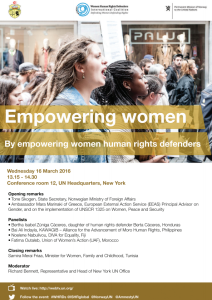
Wednesday 16 March 2016, 13.15 – 14.30
Conference room 12, UN Headquarters, New York
Opening remarks
• Tone Skogen, State Secretary, Norwegian Ministry of Foreign Affairs
• Ambassador Mara Marinaki of Greece, European External Action Service (EEAS) Principal Advisor on Gender,
and on the implementation of UNSCR 1325 on Women, Peace and Security and all other gender-related matters
Panelists
• Bai Ali Indayla, KAWAGIB – Alliance for the Advancement of Moro Human Rights, Philippines
• Noelene Nabulivon, Alternatives with Women for a New Era (DAWN), Fiji
• Fatima Outaleb, Union of Women’s Action (UAF), Morocco
Closing remarks
Samira Merai Friaa, Minister for Women, Family and Childhood, Tunisia
Moderator
Richard Bennett, Representative and Head of New York UN Office
Watch live: http://webtv.un.org/
———————————————————————————————————
GENDERING DOCUMENTATION:
A Discussion With and About Women Human Rights Defenders
FRIDAY, 18 March, 2016 – 12:30 PM
THAI CULTURAL CENTER (310 E.44th St.)
Join us for a discussion featuring activists who are thinking critically and creatively about how women human rights defenders are sharing our narratives about our lives, our activism, and the challenges we face.
Speakers
Amal Elmohandes (Egypt), Nazra for Feminist Studies
Carrie Shelver (South Africa), Coalition of African Lesbians
Moderator
Cynthia Rothschild (USA), WHRD-IC
“Documentation” – which can take many forms – is a politically motivated naming of women human rights defenders’ stories. Our discussion rests in the ideas that WHRDs work with bravery and resilience, and that documentation of our experiences of both abuses and activism is critically important. For many, documentation is a courageous act of resistance. Yet, our stories are often untold.
Presented by the WHRDIC with co-sponsoring members, including:
Amnesty International, Association for Progressive Communication WRP, Association for Women’s Rights in Development, Center for Women’s Global Leadership, Coalition of African Lesbians, Front Line Defenders, International Service for Human Rights, ISIS-WICCE Uganda, Nazra for Feminist Studies, Urgent Action Fund, Women’s Global Network for Reproductive Rights, World Organization Against Torture – OMCT/FIDH
The Women Human Rights Defenders International Coalition has just launched its most recent publication: Gendering Documentation: A Manual for and About Women Human Rights Defenders.
———————————————————————————————————
WHRDIC members are participating in many events at the CSW60:
AWID EVENTS happen every day of the CSW! For more information consult: http://www.awid.org/get-involved/awids-calendar-events-csw60
March 15
MADRE EVENT: Implementing the Women, Peace and Security Agenda: A Roadmap for the 1325 Global Study Recommendations
When UN Security Council Resolution 1325 passed, it marked a milestone commitment by governments to include women’s leadership in peacemaking. Fifteen years later, women peace activists are still too often excluded from the negotiating table. But a UN Global Study on Resolution 1325 proposes a way to change this, with recommendations to policymakers.
How can we bring these recommendations to life? Join experts and activists in a participatory discussion to find out.
Speakers
Leymah Gbowee, Nobel Laureate
Radhika Coomaraswamy, Global Study Author
Phumzile Mlambo-Ngcuka, Executive Director, UN Women
Madeleine Rees, Secretary-General, Women’s International League for Peace and Freedom
Yifat Susskind, Executive Director, MADRE
Lisa Davis, CUNY Law School & MADRE
Tuesday, March 15, 2016 | 1:00pm – 5:00pm (FREE Entry)
CUNY Law School | 2 Court Square | Long Island City, NY 11101
ISIS-WICCE EVENT: Peace at the Frontline of the Sustainable Development Goals
Speakers
Helen Kezie – Nwoha (Isis-WICCE):
Global Peace and Security: A Reflection on SDG16 from a gender perspective.
Muadi Mukenge (Global Fund for Women)
The Peace and Security Cooperation Framework for the Great Lakes Region: Gains and the unfinished business
Dr. Renu Rajbhandari (National Alliance of Women Human Rights Defenders – Nepal): Recovering from armed conflict; Trapped by Natural disasters: Defending women at all costs”.
Bai Ali Indayla (KAWAGIB1 , Phillipines). Confronting militarism; Protecting environmental rights: Reflections from KAWAGIB
Linnea Hakansson, World YWCA;
Recharging the Movement for Peace and Security: Insights from WYWCA’s approach
Moderator
Juliet Were; Programme Coordinator – Isis-WICC
Tuesday, March 15, 2016 2:30-4_30pm
Church Centre; Drew Room
March 16
MADRE EVENT: New Tools and Next Generation Strategies to Advance Women’s Human Rights
More than 20 years ago, women won recognition that “women’s rights are human rights.” This widened definition was a victory for global women’s movements, and it allowed us to demand new rights-based polices for women worldwide. But today, the movements confront an impasse. The strategies honed two decades ago are far less effective in advancing women’s rights. What paradigm shifts are necessary now?
Speakers Include:
Charlotte Bunch, Founding Director and Senior Scholar, Center for Women’s Global Leadership (CWGL)
Rose Cunningham, Founder and Director, Wangki Tangni
Mallika Dutt, Founder and President, Breakthrough
Anita Nayar, Director, Regions Refocus
Yifat Susskind, Executive Director, MADRE
Wednesday, March 16, 2016 | 8:30am – 10:00am (FREE Entry)
Thai Cultural Center, Suite L, Room 1| 310 E 44th St | New York, NY 10017
URGENT ACTION FUND EVENT: Celebrating Women Charting a Path for Women’s Peace in Korea
UAF is pleased to co-sponsor an evening on women building peace with Gloria Steinem and Nobel Peace Prize winner Leyman Gbowee. The event will feature women peacemakers from South Korea, Japan and the U.S. who are actively working across national boundaries for peace and the reunification of Korea.
When: Wednesday, 16 March, 6 PM – 9 PM
Where: Address given upon request (info@womencrossdmz.org)
Rally for Justice! Rally for Berta!
https://www.facebook.com/events/470220636519266/
#NiUnamás – #JusticiaParaBerta – #BertaPresente- #NotOneMore – #JusticeforBerta
URGENT ACTION FUND EVENT: Women Human Rights Defenders Respond to Extractive Industries: Experiences
Event Moderator: Monica Aleman Cunningham, Senior Program Officer, Ford Foundation
Event Speakers:
Kate Kroeger, Executive Director, Urgent Action Fund
Bai Ali Indayla, Environmental Human Rights Defender, Philippines
Tatiana Cordero, Executive Director, Urgent Action Fund-Latin America
Lina Solano, Environmental Human Rights Defender, Ecuador
Ndana Bofu-Tawamba, Executive Director, Urgent Action Fund-Africa
Emem J. Okon, Environmental Human Rights Defender, Nigeria
Urgent Action Fund, Urgent Action Fund-Africa, and Urgent Action Fund-Latin America
When
Thursday, March 17, 2016 from 2:30 PM to 4:30 PM (EDT) – Add to Calendar
Where
Roger Smith Hotel, Starlight Loft, Mezzanine Floor – 501 Lexington Avenue, New York, NY 10017
More information and RSVP
MARCH 18
ASSOCIATION FOR PROGRESSIVE COMMUNICATIONS WITH DUE DILIGENCE PROJECT EVENT: SDG 5 and Online VAW: Who’s Accountable? Due Diligence, the State & Internet Intermediaries
Access to information and communications technology is key to women’s empowerment. The transformative potential of the internet is (increasingly) under threat by high levels of online violence against women. Increased prevalence of online violence against women, the lack of effective measures to prevent and contain it and the ensuing impunity has created barriers to women becoming full participants and equal players in development. Event organised in conjunction with The Kingdom of the Netherlands and the Government of Malaysia.
Speakers
Zarizana Abdul Aziz, Due Diligence Project Director
Dubravka Simonovic, UN Special Rapporteur on violence against women, its causes and consequences
Frank La Rue, Former UN Special Rapporteur on Freedom of Expression (Statement)
Jan Moolman, Association for Progressive Communications
Tania Farha, UN Women
Moderator
Janine Moussa, The Global Women’s Institute
When
Friday, 18 March, 10:00- 11:30AM
Where
Permanent Mission of the Kingdom of the Netherlands at the UN, 666 Third Avenue, 19th Floor, New York 10017 (between 42nd and 43rd street)
NATIONAL ALLIANCE OF WOMEN HUMAN RIGHTS EVENT: Promoting Safety and Security of Women Human Rights Defenders through Community Leadership and Governance
18 March, 4:30 PM
Church Center
More information: https://www.facebook.com/events/506584229526652/
More to come!
PROMINENT HUMAN RIGHTS ORGANIZATION PIONEERED BY WHRDS FACES THREAT OF CLOSURE
El Nadeem Center for the Rehabilitation for Victims of Violence and Torture is a prominent human rights organization which, since 1993, is providing support to torture victims and families of those who were subject to enforced disappearances in Egypt. Since 17th of February authorities in Egypt delivered a closure order based on “breaching license conditions” and have launched a smear campaign against the organization which has supported thousands of individuals and family members confronting immeasurably traumatic experiences.
On 17th of February 2016, three men, an architect and two policemen, entered the premises of El Nadeem Center and unduly and arbitrarily requested from Dr. Mona Hamed, an Egyptian WHRD and the Director of the Clinic, to leave the office. The lawyers negotiated the closure order and have extended it until 22 February 2016 to investigate the allegations brought against El Nadeem Center and provide justifications to the Ministry of Health.
The authorities in Egypt further escalated the aggression towards the organization via disseminating misleading information in an attempt to libel their meaningful contributions to the advancement of human rights in Egypt for more than two decades. On 24th of February 2016 the Ministry of Health released a statement discrediting the organization, which was published in Shorouk newspaper as well as in English on the Facebook page of the Ministry of Foreign Affairs (MFA). El Nadeem responded to all false accusations via an announcement.
El Nadeem Center has not only supported victims of torture and families of those who were subject to enforced disappearances. The center is at the heart of the women’s rights struggle in Egypt and is critical to fostering women’s rights in Egypt and the wider region. The center was instrumental in drafting a law to prevent and protect women from domestic violence and have been advocating for its acceptance by the Parliament. El Nadeem has also issued important publications on sexual violence in Egypt in an attempt to raise awareness on gender-based violence in the country.
The WHRD Mena Coalition has warned that the closure threat brought against the Center has wider implications for WHRDs in the region. The Coalition has stressed that “As El Nadeem center is mostly run by pioneering WHRDs of Egypt who have been on the frontline of pushing the gender agenda in the country, they have inspired their fellow activists in the region. The closure of the center will certainly send a message to the women rights movement in the region of potential implications they might face by their government if they continue their committed advocacy.”
The WHRDIC strongly urges the government of Egypt to cease all acts of harassment against the El Nadeem Center for the Rehabilitation for Victims of Violence and Torture. The WHRD-IC stands in solidarity with women human rights defenders in Egypt and the wider region, who continue their meaningful human rights advocacy at the face of such gruesome threats and restrictions.
Notes
The Women Human Rights Defender International Coalition is a resource and advocacy network supporting women human rights defenders worldwide. We have 32 members including:
Amnesty International (AI)
Asia Pacific Forum on Women, Law and Development (APWLD)
Asian Forum for Human Rights and Development (FORUM ASIA)
The Association for Progressive Communications Women’s Networking Support Programme (APC WNSP)
Association for Women’s Rights in Development (AWID)
BAOBAB for Women’s Human Rights (BAOBAB)
Center for Reproductive Rights (CRR)
Center for Women’s Global Leadership (CWGL)
Coalition of African Lesbians (CAL)
Frida the Young Feminist Fund
Front Line Defenders
Human Rights First
Information Monitor (INFORM)
International Federation for Human Rights (FIDH)
International Service for Human Rights (ISHR)
International Women’s Rights Action Watch Asia Pacific (IWRAW-AP)
Isis International
ISIS Women’s International Cross-Cultural Exchange (ISIS-WICCE)
Just Associates (JASS)
The Latin American and Caribbean Committee for the Defense of Women’s Rights (CLADEM)
MADRE
Nazra for Feminist Studies
Nobel Women’s Initiative (NWI)
Peace Brigades International
Rainbow Rights Project (R-Rights)Inc.
Society for Appraisal & Women Empowerment in Rural Areas (SAWERA)
Urgent Action Fund for Women’s Human Rights (UAF)
Women Living under Muslim Laws (WLUML)
Women’s Global Network for Reproductive Rights
Women’s Initiatives for Gender Justice (WIGJ)
Women’s Rehabilitation Centre (WOREC)
World Organisation against Torture (OMCT)
#16Days of activism infographic
WGNRR’s #SRHRheroes campaign, which will run during this year’s #16Days of Activism against Gender-Based Violence (25 Nov-10 Dec). Through this campaign we are looking for the recognition of SRHR activists as WHRDs and demand that they are able to access existing protection mechanisms and hold governments accountable for their responsibility to protect them and their work. We are also looking to highlight the courageous actions of our colleagues and friends– defenders of sexual and reproductive rights, particularly those who have lost their lives for this cause, and those who have been victims of repression, extremism, intolerance, attacks, threats or intimidation. For more information click here.
Wu Rongrong, one of the Chinese Feminist Five has talked about her suffering during the police interrogation and her detention.
The author of this article prefers to remain anonymous.
Meeting Wu Rongrong
Recently, I was blessed to meet up with Wu Rongrong, one of the “Feminist Five” in Hangzhou, China. On April 13, Ms. Wu was sent back to Hangzhou by Beijing police under the condition of “on bail awaiting trial”. I organized her own narratives about what she has gone through into this article.
There will be sub-sectional titles with question marks below. That’s because the article is written based on Ms. Wu’s own narratives only. I do believe Ms. Wu was telling the truth, but since I did not interview the police, I use the question marks here to demonstrate certain objectivity for the article here as it is based on Ms. Wu’s unilateral story. Such a question mark could be also considered as a form of “procedural justice” in writing and reporting.
The Crashing down of A Wonderful Plan
Ms. Wu told me the details of their wonderful activity plan – the performance art with the theme on “Anti-Sexual Harassment” on March 7. They had prepared the stickers sent out to the pedestrians writing “Prevention of Sexual Harassment, Safety made by Everyone of Us,” “When you are sexually harassed, don’t be afraid and ask the police for help immediately.”
“But we were not able to make it eventually. At around 2:00pm on March 7, I was taken away by the police in Xiaoshan Airport. At 11:00am the next morning, I was taken to Beijing and had detained in the Haidian Detention Center ever since then.” Ms. Wu told me, “As a matter of fact, on the morning of March 06, I got the call from the Guobao in Hangzhou (the policemen from the Department of State Security). They asked me to stop the activity and I actually agreed to do that at that moment.”Ms. Wu believed that she was detained by the police due to their activity plan on March 07.
“Occupy Men’s Room” – the Old Activity Two Years ago Becoming the New Charge?
Ms. Wu said “in fact, our March 7 plan has never been carried out. There is no reason for my detention. This detention is unlawful. After the police held me in control, they changed their indictment against me about the performance art – “Occupy Men’s Room” two years ago.” Ms. Wu is furious about Beijing police’ actions – “detaining someone based on some reason first and then changing it to another reason after the detention.”
According to Ms. Wu, “Occupy Men’s Room” in the early spring of 2012 was the performance art conducted by feminist activists in Beijing and Guangzhou. Their activity did not really take over the men’s room, but took the form of performance art demonstrating their concerns for the disproportional ratio of women’s and men’s rooms. They aimed to solve the social issue that women have always had to wait for a long time in a long line for using the public bathrooms.
The activity was actually conducted in this way. They found a public bathroom, firstly explained to the men who were going to use the bathroom about their activity and only after they got the consent from those men did they symbolically “occupy” the men’s room for 10 minutes (and let the women who were waiting for a long line for the women’s room next to use the men’s room instead). They also held a sign writing “Protection of Women’s Rights” outside of the public bathrooms. And that’s it.
In fact, when searching online, it could be seen that there were a lot of positive media comments on this performance art. But now, Ms. Wu said with indignation, “the police mainly interrogated me because of this activity I participated into three years ago. This activity ridiculously became the charge against me for ‘picking quarrels and provoking a disturbance’!”
Humiliated, Threatened and Insulted during Interrogation in Detention Center?
“I was humiliated the moment I was thrown into the detention center. They would not let me sleep on a bed. I was made to sleep on the floor even though I saw empty bunks. They wouldn’t allow me to sleep on the bed because I have hepatitis B,” said Ms. Wu. “Also, many of the interrogations were made at night. I was only allowed to return when most of my cellmates were already long asleep. Interrogation under fatigue exacerbated my liver condition.”
Ms. Wu also told the author that “they [the police] would often threaten me right before they started the inquisition record (written and simultaneous video recordings). They would yell at me ‘we will tie you up and throw you into the men’s cells, and let them gang rape you.’ Or they would say things like ‘you have a 4-year-old son, right? Seems like he’s going to have some trouble in his future education and work.’ Threats like those would always proceed their recorded inquisition.”
Moreover, Ms. Wu also said. “while in the detention center, a man in police uniform would come to me out of nowhere and verbally insult me out of no reason. I have no idea who he is, but suspect that he was doing so under specific police order. This is implicit in his loud humiliating words, like, ‘you are a scum. The scums like you poison girls’ minds nowadays. Men used to enjoy polygamy with multiple wives and concubines but no longer can. Now we are all suffering tremendously because of you.'”
ID was “made lost” by the police?
Ms Wu said, “after the 37-day detention, the prosecutor denied the arrest and therefore the police had to release me under the condition of “on bail awaiting trial”. However, when I was getting ready to go back to Hangzhou, The police officer Zhu Jihua told me that they lost my ID, which they took from me (they confiscated my ID during my detention). So now, they can’t give me back my ID.”
Ms Wu is very sad. She said, “without ID, my life becomes very inconvenient. The procedure of applying for a new one is very troublesome. I need to go back to my hometown in Shanxi, and it will cost me several thousands of RMB. As a social worker with low incomes, this is simply too much for me.”
More about the feminist five:
WHRDIC urges Chinese authorities to release five young feminists
【女权五姐妹之一武嵘嵘被拘遭北京审讯时遭公安威胁:把你捆绑后扔到男号里让他们轮奸你!】
武嵘嵘遭遇自白
佚名
近日,有幸在杭州见到了“女权五姐妹”之一的武嵘嵘,武女士是4月13日被北京警方以“取保候审”的名义送回杭州的,按照武的叙述,我将其叙述的遭遇写成文字稿。
下文会有“小标题”,因为是武女士单方面的叙述,虽然我相信武女士说的是真话,但是由于没有采访警方,所以很多“小标题”后面会打个问号,表明此乃武女士单方面的诉说,以示客观公正,这也算是“写作的程序正义”吧!
美好计划的破灭
武女士告诉笔者她们的美好计划——原定今年三月七日的一场行为艺术,主题是“反对性骚扰”,他们已经制作了一些“小粘贴纸”发给路人,“小粘贴纸”上写了“预防性骚扰,安全你我他”、“当你遭遇性骚扰的时候,请不要害怕,请及时报警”之类的文字。
“但是没等我们开展这场活动,3月7日下午两点左右,我在萧山机场被警方带走,次日晚上11点被送往北京,关押在海淀区看守所”。武女士告诉笔者。武女士说“其实早在6号,我就接到杭州国保的电话,他们让我不要活动了,我当时其实也是答应取消活动的。”
武女士认为,警方控制她,肯定是因为她们三月七日的活动计划。
两年前的“占领男厕所”运动成为“罪状”?
武女士说:“其实三月七日的计划我们根本还没有开展,他们抓我是更是没有任何理由的,这样的抓捕是违法的,我被控制后,警方又改变了抓捕理由,他们重点审我两年前参与的‘占领男厕所’运动”。武女士对北京警方这种“先以种理由进行抓捕,抓捕后再改变抓捕的理由”的做法十分愤慨。
按照武女士的描述,所谓“占领男厕所”运动,是2012年初春,他们女权活动者们在广州、北京开展的一场行为艺术,不是真正去占领男厕所,而是对当前男女厕位不均衡问题的行为表达,希望通过这种活动消除女性在公共场所如厕排队现象。
活动细节是这样的,他们在当地找一家厕所,并和正要行“方便”的男同胞们协商一下,得到几位男士的理解后,活动者象征性“占领”厕所10分钟左右,然后举个写着维护女性权益类的宣传标语的牌子,活动就结束了。
其实通过网络搜索,可以看到当时很多媒体给了这场行为艺术正面的评价。但是,现在武女士很愤慨:“警方重点审讯我三年前参加的这场活动,它居然成为了我‘寻衅滋事’的罪状!”
看守所、审讯室遭遇羞辱、威胁和辱骂?
“一进去我就遭遇羞辱,他们不让我睡床上,让我睡地上,我看到还有几张空床位,但是他们不让我睡床位,理由是我有乙肝病。”武女士说。“还有,多次审讯是在晚上,那时同屋的人都睡觉睡很久了我才能回去,疲劳审讯加重了我的病情,因为我有肝炎。”
武女士还告诉笔者:“他们给我做笔录和同步录音录像开始之前,会给我很大的威胁,比如他们向我吼‘把你捆绑后扔到男号子里去,让他们轮奸你’,还有比如‘你儿子才四岁吧,以后上学和工作都会麻烦了!’诸如此类的威胁。总是要先经过一番威胁后,他们才开始给我做笔录。”
此外,武女士还说“在看守所,有一名穿着公安制服的男子会莫名奇妙跑过来骂我,我也不知道他是什么人, 我怀疑是受到警方特别授意的,比如他们会大声骂我‘你这个人渣,就是你这个人渣,毒害女孩,以前男人都可以三妻四妾的,现在我们被你们害苦了’”
在看守所期间肝炎没有得到及时救治?
武女士告诉笔者,她患有乙肝,处于发病状态。今年3月5日刚去医院治疗,被抓捕的时候,她随身带着病历、体检指标和几种药,都是按照医嘱定时服用的,尤其是一种叫“恩替卡韦分散片”是不能随便停药的,否则就很危险。但是到了看守所里,药就被收走了,武多次向看守所提出要求,要求及时治疗,武的辩护人王律师多次向看守所提议,但看守所一直不重视,直到3月19日,武才在公安医院接受治疗,此时武的病情已经十分严重。“我出来后,看到了很多网友的呼吁信,其中我看北京地坛医院的知名医生说像我这样停药,会有生命危险的。”
身份证被警方弄丢了?
武女士说:“整整关押37天后,检察院不给公安局批捕,警方对我采取所谓‘取保候审’,但是等我出来准备回杭州的时候,朱继华警察跟我说把我的身份证弄丢了(他们之前把我的身份证扣押了),所以不能把身份证还给我了。”
武女士十分难过,她说:“没有身份证,很多正常的生活都无法开展,而且补办特别麻烦,还需要回山西老家去,又要白白花掉几千元前,作为一名社工,收入本来就低。
La Lucha: The Story of Lucha Castro and Human Rights in Mexico
This month, Front Line Defenders and Verso launch La Lucha: The Story of Lucha Castro and Human Rights Defenders in Mexico. The first in a series of nonfiction graphic novels, La Lucha features the real life stories of women human rights defenders (WHRDs) in northern Mexico who confront lethal challenges in order to promote human rights, justice and accountability. A series of vignettes threaded together by one of the leading Mexican WHRDs, Lucha Castro, the book offers a rich depiction of the complexity and challenges in the lives of WHRDs and the profound importance of their work.
The day after the book was released in bookstores, the Women Human Rights Defenders International Coalition released a statement detailing a campaign of defamation against Lucha Castro and her colleague Irma Villanueva, which puts the two women at direct risk. This is precisely the conditions this book is meant to address and counter – to provide a counter-narrative to the efforts to smear, harass and defame human rights defenders.
La Lucha is the first in a series of nonfiction graphic novels from Front Line Defenders documenting the stories of human rights defenders at risk around the world. Particularly in the human rights field, this project is unprecedented, seeking to provide an innovative platform with unique content that demonstrate the role of human rights defenders in promoting open and just societies.
The book is published by Verso (US and UK) in English, and will soon be released in Spanish in Mexico and throughout Spain and the Americas (as well as other languages). In addition to general release, the book will be soon published in a dynamic digital format which will allow for multimedia engagement, ongoing updates to the book based on developments in the field, and the ability to engage active storytelling as a means of educating for human rights.
“This book gives evidence of the risks and adversities human rights defenders across the world have to face to make the rights of their communities a reality”, explains Adam Shapiro, Head of Campaigns at Front Line Defenders and co-author of the book, “The bravery, persistence and hope women rights defenders featured in the book exhibit in their day to day lives make up these stories of real life heroes”.
“In my journey as a defender,” says woman human rights defender, Lucha Castro, main character in the graphic novel, “I have learned to listen to the stories of women who suffer violations of their human rights, with compassion and a reverence that compels me to respect their lives. I am convinced that it is through acts of love and justice that we can proclaim the scandal of all the unjust acts imposed on women, represented by all forms of violence, many of them hidden. By empowering women we can encourage them to rebuild their lives.”
Get your own copy of the book for a 20 euro donation in support human rights defenders at risk: https://www.
See an excerpt of the first chapter of the book in an interactive format: http://www.flipsnack.com/
 Women Human Rights Defenders International Coalition
Women Human Rights Defenders International Coalition